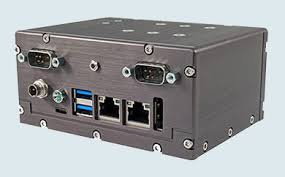What Is an Industrial Embedded PC?
Welcome to the world of industrial fanless embedded pc, where cutting-edge technology meets rugged durability! In today’s demanding industrial environments, businesses are turning to these powerful computing devices designed to withstand harsh conditions and deliver reliable performance. Join us as we explore the unique features, top brands, and common uses of industrial-embedded PCs, revealing their significance in modern manufacturing and automation processes. Get ready for an enlightening journey into this game-changing technology!
Table of Contents
What Makes an Industrial Embedded PC Different?
Industrial fanless embedded pc stand out as purpose-built devices designed to thrive in challenging industrial environments, setting them apart from conventional computers. Key features that distinguish them include:
- Ruggedness and Durability: Built to withstand extreme temperatures, vibrations, dust, and moisture, ensuring functionality in harsh industrial conditions.
- Compact Size: A smaller form factor allows for easy integration into machinery or equipment with limited space, providing versatility in deployment.
- Fanless Design: Enhances reliability by eliminating the risk of fan failure, and reducing noise levels—an important consideration in noise-sensitive environments.
- Connectivity Options: Strong connectivity options, including multiple serial ports, Ethernet ports, USB interfaces, and expansion slots, facilitate seamless communication with other devices on the factory floor.
- Long Lifecycle Support: Extended availability of components and long-term software support address the need for stability and consistency in industrial environments, avoiding frequent system upgrades.
- Versatility Across Industries: Adaptable for various industries, such as manufacturing automation systems, transportation networks, energy infrastructure, and retail kiosks, contributing to widespread use.
In summary, industrial-embedded PCs offer a tailored solution for environments that demand durability, reliability, and specialized features. Their important role in optimizing processes and enhancing efficiency across diverse industries underscores their significance in the modern industrial landscape.
Key Features and Benefits of Industrial Embedded PCs
Industrial fanless embedded pc are specifically designed to withstand the demanding conditions of industrial environments. These rugged devices offer a wide range of key features and benefits that make them essential for various applications.
Key Features
- Durability: Built to withstand extreme conditions such as temperature variations, shocks, vibrations, and humidity, ensuring reliable performance in challenging industrial environments.
- Compact Size: A smaller form factor allows for easy integration into tight spaces and machinery, providing versatility in installation.
- High-Performance Capabilities: Equipped with powerful processors, ample memory, and rich storage options to efficiently handle complex industrial tasks.
- Connectivity Options: Extensive connectivity features including USB ports, Ethernet ports, serial ports, and wireless connectivity (Wi-Fi, Bluetooth) facilitate seamless communication with other equipment and networks.
- Fanless Design: Fanless systems reduce maintenance requirements, eliminate the risk of fan failure, and minimize noise pollution in sensitive industrial environments.
Benefits
- Reliability: Ensures uninterrupted operation, minimizing downtime due to hardware failure or environmental factors and enhancing overall system reliability.
- Enhanced Productivity: Contributes to improved productivity by providing continuous operation and stability in industrial processes.
- Long Lifecycle Support: Guarantees compatibility with existing software, reducing the need for frequent upgrades or replacements and resulting in long-term cost savings.
- Versatility Across Industries: Suitable for various applications including manufacturing automation, transportation systems, energy management, and more, showcasing adaptability to diverse industrial needs.
- Space Efficiency: Compact design allows for efficient use of space in industrial settings, important where space is limited or where equipment needs to be integrated into existing systems.
- Reduced Maintenance Requirements: Fanless design minimizes the accumulation of dust and debris, reducing maintenance needs and increasing the overall lifespan of the device.
- Cost Savings: Long lifecycle support, reduced downtime, and lower maintenance contribute to cost savings over the lifespan of the industrial-embedded PC.
In summary, industrial fanless embedded pc provide a strong, reliable, and efficient computing solution tailored to meet the demanding requirements of industrial applications.
Types of Industrial Embedded PCs: Fanless vs. Non-Fanless
When it comes to industrial fanless embedded pc, there are two main types that you should be aware of fanless and non-fanless. Both options have their unique benefits and considerations.
Fanless Industrial Embedded PCs
- Cooling Mechanism: Relies on passive cooling mechanisms such as heat sinks or heat pipes, eliminating the need for a cooling fan.
- Durability and Reliability: Generally more durable and reliable due to fewer moving parts, reducing the risk of failure in harsh environments.
- Environmental Suitability: Ideal for environments with dust, debris, or moisture where traditional fans may be at risk.
- Low Maintenance: Requires lower maintenance as there is no fan to accumulate dust or suffer from mechanical failure.
Non-Fanless Industrial Embedded PCs
- Cooling Mechanism: Incorporates active cooling methods using fans to dissipate heat, making them suitable for high-performance computing.
- Performance: Excels in situations where significant computing power is required, as fans efficiently dissipate heat from powerful processors and components.
- Flexibility: Often offers greater flexibility in terms of expansion slots and customization options.
- Controlled Environments: Suited for controlled operating conditions with proper ventilation or temperature control measures in place.
Understanding these differences enables businesses to make informed decisions based on their specific use cases and environmental conditions when selecting industrial-embedded PCs.
Top Brands and Models in the Market
When it comes to industrial fanless embedded pc, several top brands and models have made a name for themselves in the market. These companies prioritize quality, reliability, and performance, ensuring that their products meet the demanding requirements of industrial applications.
1. Sintrones
- Known for offering a range of industrial embedded PCs suitable for various industries.
- Popular for their fanless embedded PC models, they provide silent operation and efficient heat dissipation.
2. Siemens (SIMATIC IPCs)
- Offers ruggedized computers under the SIMATIC IPC series designed to withstand harsh industrial environments.
- Features high processing power and extensive connectivity options to meet the demands of industrial applications.
3. Beckhoff Automation
- Known for compact design and strong construction in their line of Embedded PCs.
- Particularly recognized for fanless models suitable for installations where space is limited or noise reduction is important .
4. Axiomtek
- Offers a wide selection of fanless embedded PCs with versatile I/O configurations.
- Known for providing solutions that cater to various industrial requirements.
5. Kontron
- Specializes in reliable systems designed for important applications requiring long-term availability.
- Known for delivering industrial-grade solutions with a focus on durability and performance.
These brands represent a subset of the diverse options available in the industrial fanless embedded pc market. Their focus on quality, reliability, and performance makes them go-to choices for businesses operating in industrial settings where strong computing solutions are essential. When selecting an industrial-embedded PC, businesses can consider these reputable brands to ensure that their specific needs are met.
Factors to Consider When Choosing an Industrial Embedded PC
When selecting an industrial fanless embedded pc, several important factors should be considered to ensure optimal performance in demanding environments:
- Application Requirements: Assess specific application needs to guide decisions on processing power, memory capacity, and overall performance requirements.
- Connectivity Options: Evaluate the number and types of ports available for seamless communication with other devices, networks, or peripherals.
- Ruggedness and Durability: Look for devices designed to withstand harsh industrial conditions, including high temperatures, vibrations, and dust, without compromising performance.
- Size and Form Factor: Consider the physical dimensions and form factor based on installation space limitations, whether compact or rack-mountable.
- Reliability: Prioritize reputable brands known for producing reliable products with long lifespans, minimizing the risk of downtime.
- Technical Support and Warranty: Check the availability of technical support and warranty options, ensuring access to experts in case of issues.
- Cost-Efficiency: Balance cost and quality, evaluating different models based on their features versus price ratio to ensure cost-effective solutions.
By carefully weighing these factors, you can make an informed decision when selecting an industrial fanless embedded pc. This ensures that the chosen device not only meets your immediate application requirements but also proves strong enough to handle the challenges of industrial environments effectively.



